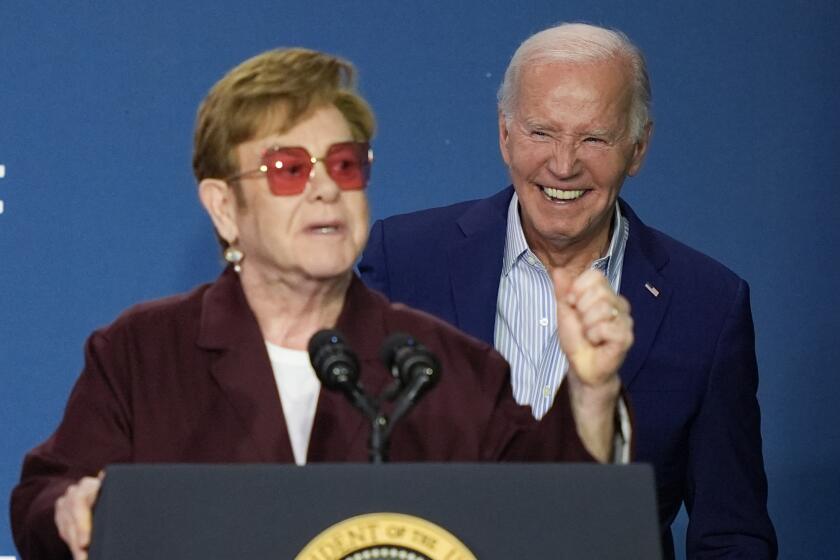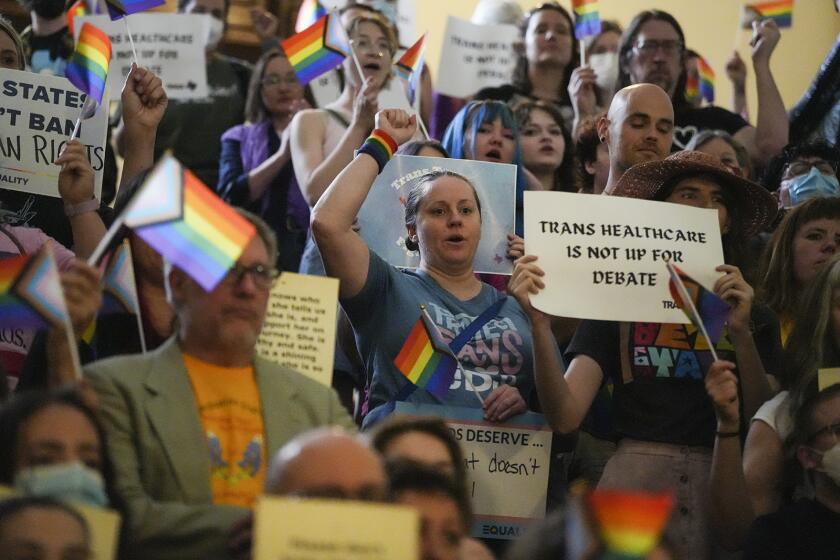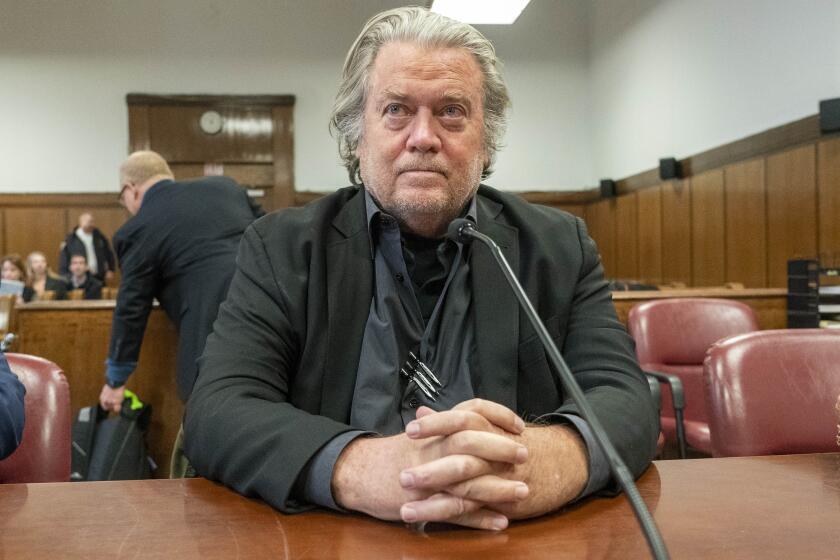Lifting a red velvet curtain
The Wagah army outpost in North India is the only official road crossing between India and Pakistan. The dusty village is fortified by electric fencing, and soldiers conceal themselves in bunkers. The tranquil fields hide land mines. The site has witnessed horrific carnage: Thousands were killed there during the mass migration of 1947 when the British partitioned India into two countries. Every evening, high-stepping Indian and Pakistani guards perform a ceremonial lowering of flags, cheered by noisy audiences. It’s provocative theater, resonating with 57 years of distrust and bloodshed.
On July 7, a film crew from Bombay descended on the Wagah border. This was no ordinary set-up: Bollywood’s most venerated director, the 75-year-old Yash Chopra, was shooting “Veer-Zaara,” an epic love story between an Indian rescue pilot and a Pakistani girl. The night before, a colonel on the Indian side had requested a Pakistani major to open the gates at 7 a.m. instead of the usual 9:30. But in the morning, the gates stayed shut.
The Pakistanis said they did not have permission from higher authorities. While officers exchanged heated words, Chopra stayed serene. His A-list actors, Shah Rukh Khan and Preity Zinta, sat in sweltering heat under a neem tree awaiting orders. The Pakistani soldiers seemed mortified at rebuffing a crew that included their favorite stars. Eventually the scene was shot with the gates on the Pakistani side closed.
Bollywood’s biggest names couldn’t open the gates to Pakistan that day, but Chopra is hopeful that when “Veer-Zaara” comes out on Nov. 12, other, more firmly entrenched barricades will give way. “We are filmmakers, not leaders,” he says, “but there will never be a better film to bring India and Pakistan together.”
Bollywood is probably India’s most effective emissary in Pakistan. The two countries have fought three wars, and in June 1999, Pakistani infiltrators crossed the designated Line of Control into India and almost instigated a nuclear conflict. But in the last two years, politicians are taking hesitant stabs at peace -- and so is Bollywood. Hindi films, which often peddled a fiercely anti-Pakistani sentiment, are adopting a kinder, gentler tone. Artists and technicians are increasingly crossing the borders; a few co-productions are in the works. More critically, there is a move to ease the Pakistani ban on Indian films. Decades of political maneuvering haven’t defused the hostility between the neighbors; perhaps celluloid diplomacy will.
Bollywood films are a surreptitious pleasure in Pakistan. In 1965, the country banned the import and screening of Indian films, but Bollywood, with its extravagant spectacles of song and dance, is everywhere. Technology -- essentially pirated DVDs, videocassettes, cable and satellite television -- has enabled Hindi film to penetrate even small towns in Pakistan. Bollywood films are reviewed in the vernacular and English press. Bollywood stars dictate fashions and rituals, particularly at weddings, as Pakistani writer Nasreen Rehman, who was a consultant on “Veer-Zaara,” points out: “People try to emulate ‘filmi’ dances, songs and clothes. This despite the fact that Radio Pakistan does not play Hindi film songs.” Pakistani fans are just as up-to-date on stars, movies and gossip as their Indian counterparts.
The film industry in Pakistan’s Lahore, or Lollywood, as it is often called, is a poorer, watered-down version of Bollywood. The two industries have shared roots: Some of Bollywood’s biggest names -- filmmaker B.R. Chopra, producer G.P. Sippy -- came to Bombay (now officially Mumbai) from Pakistan during partition, and many pioneers of the Pakistani film industry -- actress Noor Jehan and her filmmaker husband Shaukat Hussein Rizvi, directors W.Z. Ahmed and Zia Sarhady -- crossed over from Bombay. Sadat Hassan Manto, the subcontinent’s most revered Urdu writer, was associated with studios in Bombay before he moved to Lahore.
But post-partition, the two film centers had dramatically different evolutions. Today, Bollywood is a global brand making more than 200 films annually and Indian films have an estimated 3.6 billion viewers worldwide. Hindi films have been screened at the Cannes, Berlin and Venice film festivals, and in 2001, “Lagaan” (Land Tax) even made it to the Oscars.
Lollywood, meanwhile, is in shambles. The Lahore film industry makes less than 50 films annually, down from more than 300 five years ago. Most of these are unarguably shoddy. The equipment is dated. There are no film schools or training institutes in Pakistan. The 225-odd theaters are in various stages of decay because the middle and upper classes prefer to watch Bollywood and Hollywood at home.
In this David and Goliath contest, David doesn’t stand a chance. Lollywood simply can’t match the glamour and frisson of Bollywood.
Hindi film stars are deities in Pakistan. Earlier this year when actor Akshay Kumar was invited by a prestigious golf club in Lahore to perform on stage, three jeeps bearing machine gun-wielding commandos escorted him to the venue, where 2,000 people came for the private show. But when Shaan, a superstar in Lahore who has had an astounding 214 releases, walked the streets of Bombay in March, no one recognized him.
Change of heart
Until recently, Bollywood filmmakers were quite willing to mine the rancor between India and Pakistan to score box office points. In 2001, “Gadar: Ek Prem Katha” (Mayhem: A Love Story), a period film in which a hardy Indian villager single-handedly decimates the Pakistani army and takes his abducted wife home, became a blockbuster. “Gadar’s” coarse but effective chest-thumping inspired a slew of films in which villains (either Pakistani or Muslim) plotted the disintegration of India. But in the last year, Bollywood, reflecting the current political climate, has largely toned down its rhetoric. Even films like the recently released “Lakshya” (Aim), about the 1999 Indo-Pakistani conflict, don’t demonize the other side. Shah Rukh Khan, a Bollywood superstar, says: “The anti-Pakistani cinema we have made is not national. It’s not patriotic to belittle anyone. Entertainers shouldn’t contribute to this.” Khan’s own production, “Main Hoon Na” (I Am There), the year’s biggest hit so far, aggressively promoted peace -- the bad guy was 100% Indian. Director Anil Sharma followed up “Gadar” with an equally rabid spy adventure called “Hero.” But his latest film, “Ab Tumhare Hawale Watan Saathiyon” (Now, the Nation Is in Your Hands), due Nov. 12, has a less shrill tone.
The change of heart reportedly has to do with Akshay Kumar, who accepted the lead role of an army officer on the condition that Sharma alter the narrative. The film’s climax now has Indian and Pakistani soldiers joining hands to protect Hindu pilgrims against terrorists. “I am not going to say anything that is against Pakistanis, their religion or their country,” Kumar says.
Co-production is the buzzword. For decades, the two industries have unashamedly stolen from each other. Pakistani filmmakers have often used Indian singers on the soundtrack without crediting them for fear of reprisal. But now a race is on to unveil the first legitimate Indo-Pakistani co-production.
Sevy Ali, a London-based producer of Pakistani origin, is co-producing two films in Bombay. “Nazar” (Gaze), a supernatural thriller, stars Pakistani actress Meera and, if Ali can juggle the geopolitics, will also have Pakistani singer Abida Parveen on the soundtrack. Ali is negotiating the Kafkaesque bureaucracy to ensure that “Nazar” is released in Pakistan.
Pakistani producer Mubasher Lucman is hoping to beat him with “Pehla Pehla Pyar” (First Love), which has Lahore actors but Bombay technicians. Lucman started the film when India-Pakistan relations were at such a nadir that the embassies had closed down. Since visas couldn’t be obtained, all negotiations were conducted by mail and phone, and the crew met for the first time when they shot in Thailand. Another Bollywood director, Shashi Ranjan, boasts that his upcoming film “Dobara” (Again) is actually the first to feature an officially sanctioned Pakistani star. Ranjan wrangled with the External Affairs Ministry for six months to get Lahore’s leading hero, Muammar Rana, to Bombay for 10 days.
Meanwhile, distributor Shyam Shroff, who was 1 year old when his family left Karachi for Bombay in 1947, is preparing to market “Khamosh Pani” (Silent Waters), the first Pakistani film to get a wide release in India in 35 years. Pakistani films aren’t banned in India but their poor quality makes them unviable. “Khamosh Pani,” directed by Sabiha Sumer, is a rarity. Starring Indian actress Kirron Kher, it is an understated but eloquent argument against religious fundamentalism. Shroff will release the film, which picked up top prizes at the Locarno International Film Festival last year.
This glasnost will reach critical mass only if Pakistan lifts the ban on Indian films. Such a move would likely benefit both countries. Bollywood will find a captive market, which could greatly increase total revenues, and Lollywood would be revamped because Hindi films would bring absconding audiences back to the theaters. In fact, the Lahore industry is actively lobbying with the government to let Bollywood in. Ali states dramatically: “If the ban is not lifted, Pakistani cinema will cease to exist.” But a Pakistani official, who did not wish to be named, says there are no immediate plans. “It is not politically palatable to lift the ban in isolation. This will be part of the overall package of whatever agreement is reached between the two countries.”
Lucman puts it more bluntly: “The Foreign Office is not comfortable with lifting the ban because then they would be left without a trump card at the negotiating table.”
Two years ago, when Lucman arrived in Thailand to shoot, he found a Bollywood film crew entrenched in the hotel. At first, the units stepped cautiously around each other. But the next day, when Pakistan lost to India in a keenly contested cricket match, Lucman sent the winners a case of beer. The ice was broken. Later, when Lucman’s film stock didn’t arrive, Indian actor-director Feroz Khan offered some of his. Lucman and Feroz weren’t adversaries then. They were just two filmmakers struggling to create memorable movies. Cinema had opened some doors.
Anupama Chopra is a film critic and author based in Bombay.
More to Read
Start your day right
Sign up for Essential California for news, features and recommendations from the L.A. Times and beyond in your inbox six days a week.
You may occasionally receive promotional content from the Los Angeles Times.






